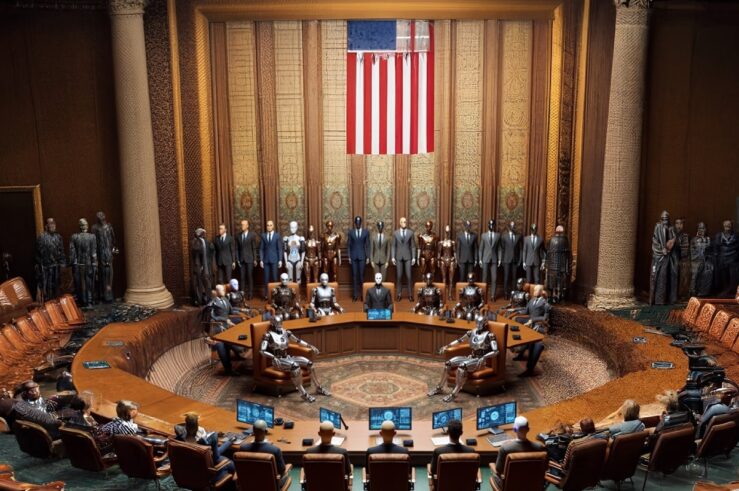The AI Legislative Puzzle
With Donald Trump’s victory in this week’s presidential election, the federal government’s approach to the regulation of artificial intelligence (AI) stands at a crucial inflection point. While there may be pressure to rush through AI legislation during Congress’ upcoming lame-duck session, such haste could prove counterproductive for U.S. leadership in AI development. Instead, this transition ... The AI Legislative Puzzle
Age-Verification Mandates: Constitutional Concerns and Policy Pitfalls
In a recent post, my International Center for Law & Economics (ICLE) colleague Ben Sperry explored the First Amendment implications of Rep. John James’ (R-Mich.) proposal to mandate app stores either verify users’ ages and or obtain parental consent for users who are minors. While that analysis provided a solid foundation for understanding the constitutional ... Age-Verification Mandates: Constitutional Concerns and Policy Pitfalls
Protecting Innovation: Proposed Reforms Threaten US Pharmaceutical Leadership
Robust property rights and calibrated regulations have long been key ingredients of the U.S. life-sciences ecosystem, facilitating the development of new drugs that require substantial investments in research, development, and commercialization. Recent legislative proposals, however, threaten to undermine this system under the guise of addressing drug-pricing concerns. Of particular concern in the current legislative landscape ... Protecting Innovation: Proposed Reforms Threaten US Pharmaceutical Leadership
ICLE and CEI Submit Amicus Brief Arguing the FCC’s Net Neutrality Order Is Unlawful
If you’ve been keeping up with the machinations of the Federal Communications Commission’s (FCC) latest attempt to regulate broadband under Title II of the Communications Act, you know that providers are challenging the rules in the 6th U.S. Circuit Court of Appeals. The court has put that case on the fast track. Earlier this week, ... ICLE and CEI Submit Amicus Brief Arguing the FCC’s Net Neutrality Order Is Unlawful
The WGA’s Misguided Fears: Unpacking the Myths of Media Consolidation in the Streaming Era
While last year’s labor disputes between the Writers Guild of America (WGA) and the Screen Actors Guild (SAG-AFTRA), on the one hand, and Hollywood’s major movie and television studios, on the other, have been settled for months now, lingering questions remain about competitive conditions in the industry. In a recent submission to the California Law ... The WGA’s Misguided Fears: Unpacking the Myths of Media Consolidation in the Streaming Era
ICLE/ITIF Amicus Brief Urges Court to Set Aside FCC’s Digital-Discrimination Rules
The Federal Communications Commission (FCC) recently adopted sweeping new rules designed to prevent so-called “digital discrimination” in the deployment, access, and adoption of broadband internet services. But an amicus brief filed by the International Center for Law & Economics (ICLE) and the Information Technology & Innovation Foundation (ITIF) with the 8th U.S. Circuit Court of ... ICLE/ITIF Amicus Brief Urges Court to Set Aside FCC’s Digital-Discrimination Rules
Systemic Risk and Copyright in the EU AI Act
The European Parliament’s approval last week of the AI Act marked a significant milestone in the regulation of artificial intelligence. While the law’s final text is less alarming than what was initially proposed, it nonetheless still includes some ambiguities that could be exploited by regulators in ways that would hinder innovation in the EU. Among ... Systemic Risk and Copyright in the EU AI Act
Navigating the AI Frontier, Part I
The European Union is on the verge of enacting the landmark Artificial Intelligence Act (AI Act), which will—for better or worse—usher in a suite of new obligations, and hidden pitfalls, for individuals and firms trying to navigate the development, distribution, and deployment of software. Over the coming months, we will be delving into the nuances ... Navigating the AI Frontier, Part I
The FTC’s Misguided Campaign to Expand Bayh-Dole ‘March-In’ Rights
The Federal Trade Commission (FTC) has now gone on record in comments to the National Institute of Standards and Technology (NIST) that it supports expanded “march-in rights” under the Bayh-Dole Act (Act). But if NIST takes the FTC’s (unexpected, but ultimately unsurprising) contribution seriously, such an expansion could lead to overregulation that would ultimately hurt ... The FTC’s Misguided Campaign to Expand Bayh-Dole ‘March-In’ Rights
EU’s Cybersecurity Draft Shifts Toward Hard Protectionism
A year ago, we cautioned that the EU Cybersecurity Certification Scheme for Cloud Services (EUCS) threatened to embed ill-conceived economic protectionism into the EU’s cybersecurity rules. And, indeed, the European Commission, which has made clear its commitment to pursue “digital sovereignty” for the European Union, can claim some preliminary successes on that front. A recent ... EU’s Cybersecurity Draft Shifts Toward Hard Protectionism
Biden’s AI Executive Order Sees Dangers Around Every Virtual Corner
Here in New Jersey, where I live, the day before Halloween is commonly celebrated as “Mischief Night,” an evening of adolescent revelry and light vandalism that typically includes hurling copious quantities of eggs and toilet paper. It is perhaps fitting, therefore, that President Joe Biden chose Oct. 30 to sign a sweeping executive order (EO) ... Biden’s AI Executive Order Sees Dangers Around Every Virtual Corner
Competition in the Low-Earth-Orbit Satellite Industry
Amazon on Friday launched its first two prototype satellites for its planned Project Kuiper internet-satellite network. It was the latest milestone in the rapid evolution of the low-Earth-orbit (LEO) satellite industry, with companies like SpaceX and OneWeb joining Project Kuiper in launching thousands of satellites to provide broadband internet access globally. As this nascent industry ... Competition in the Low-Earth-Orbit Satellite Industry
















